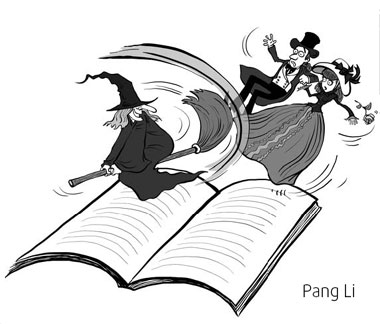Where have all the good love stories gone?
Updated: 2008-02-19 07:24
I am alone by the pool at Le Prince Maurice Hotel in Mauritius. In contrast, all the people around me are paired off. Every coupling is a story, pitted with conflict, resolution, stalemates, passions, misunderstandings, wars and truces.
A pity, then, how little hope they have of picking up a good modern novel and finding some reflection of, or consolation for, their private experiences.

On the bookshelves, they may find fantasies, sagas, and bodice-rippers, but the real stories of love, unvarnished, often brutal as well as tender, will be harder to locate.
This is odd. Love has formed a cornerstone of literary history - Pride and Prejudice, Great Expectations, Anna Karenina, The Great Gatsby, Doctor Zhivago, Lolita, to name just a few.
Jeffrey Eugenides writing in The Guardian recently did a useful job in highlighting what is still a rich mine for short story writers such as William Trevor, Alice Munro and Lorrie Moore. What he neglected to point out is that, at novel length, this most ancient and worthwhile of literary seams is struggling to produce gold.
When did we fall out of love with love? If you scan the winners of our major literary prizes, you will be hard pushed to find a single love story featured in the past 10 years. Even Ian McEwan's deservedly successful Atonement is overlaid with a second, larger narrative of war and history.
The only really interesting literary love stories have come from gay writers such as Ali Smith, Sarah Waters, Joanna Briscoe and Charlotte Mendelson.
That they concentrate, in the main, on same-sex relationships does not in the least invalidate their achievements - but it makes you wonder what has happened to the age-old saga of love between men and women, and why so few people are writing it.
Is no one producing contemporary literary love stories at novel length any more? If not, why? I am in a good position to answer these questions because most of the efforts that are being produced today cross my radar as president of the judging panel for Le Prince Maurice (LPM) prize for literary love stories.
The answer is, they are still being written, but in modest quantities and with often modest ambitions. Yet I know that some of the short-listed authors and winners of the LPM prize - Louise Dean, Anne Donovan and Joanna Briscoe most particularly - have written magnificent books that could all have found their way comfortably on to the shortlists of the big prizes. Donovan made it to the Orange, the others were passed by.
And therein lies one of the answers to the second question - why is the showing so thin? Can it be that the forces which shape the British literary scene have come to see the roman d'amour as a debased form, rubbing too closely against genre fiction and thus sullied with the taint of bad writing?
Even the most successful love-themed novels of the past generation of writers - Captain Corelli's Mandolin, Birdsong, High Fidelity, Miss Garnett's Angel, Other People's Children - have been shunned by the prize judges, and to some extent the critics.
It is a phenomenon that crosses the Atlantic, and touches other art forms. Other than the long-standing quality of Anne Tyler, no great writer of contemporary American novel-length love stories comes to mind. This is also true of film, at least commercially. A Time article last year, "Who Killed the Love Story?", noted that no love story has made the top 10 box-office draws for a decade.
The screenwriter Richard Curtis proffered an explanation that could as easily apply to fiction.
"If you write a story about a soldier going awol and kidnapping a pregnant woman and finally shooting her in the head, it's called searingly realistic, even though it's never happened in the history of mankind. If you write about people falling in love, which happens a million times a day ... you're accused of writing something unrealistic and sentimental."
Perhaps this is one of the reasons why the LPM prize is sometimes treated less seriously than other prizes.
Or perhaps it is just that old - or maybe recent - English story, that we do not "do" love. It is a bit embarrassing, a bit sickly, a bit naive. As Eugenides observed after talking to friends about love stories, "they were expecting happier, fluffier stories".
Yet the current long list I am reading features an excruciating orgy among swingers in a Scottish holiday camp, two lovers brought together by quantum physics, and love in a post-apocalyptic American landscape. The range and ambition of the material makes it plain - love is not flowers and bunny rabbits, it is life itself.
We are surrounded by love stories, most obviously, our own. We should come out of the closet and fall in love with them again, and without shame, and with passion. With love, even.
The Guardian
(China Daily 02/19/2008 page9)
|
|
|
|
|
|